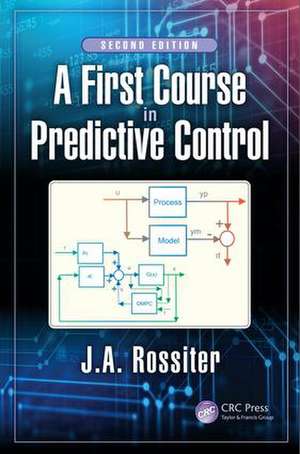A First Course in Predictive Control
Autor J.A. Rossiteren Limba Engleză Hardback – 3 apr 2018
| Toate formatele și edițiile | Preț | Express |
|---|---|---|
| Paperback (1) | 360.20 lei 22-36 zile | +35.62 lei 6-12 zile |
| CRC Press – 12 iul 2022 | 360.20 lei 22-36 zile | +35.62 lei 6-12 zile |
| Hardback (1) | 705.85 lei 43-57 zile | |
| CRC Press – 3 apr 2018 | 705.85 lei 43-57 zile |
Preț: 705.85 lei
Preț vechi: 929.12 lei
-24% Nou
Puncte Express: 1059
Preț estimativ în valută:
135.08€ • 140.51$ • 111.52£
135.08€ • 140.51$ • 111.52£
Carte tipărită la comandă
Livrare economică 14-28 aprilie
Preluare comenzi: 021 569.72.76
Specificații
ISBN-13: 9781138099340
ISBN-10: 1138099341
Pagini: 426
Ilustrații: scatter color; 29 Halftones, color; 107 Halftones, black and white; 3 Tables, black and white
Dimensiuni: 156 x 234 x 30 mm
Greutate: 1.85 kg
Ediția:2 New edition
Editura: CRC Press
Colecția CRC Press
ISBN-10: 1138099341
Pagini: 426
Ilustrații: scatter color; 29 Halftones, color; 107 Halftones, black and white; 3 Tables, black and white
Dimensiuni: 156 x 234 x 30 mm
Greutate: 1.85 kg
Ediția:2 New edition
Editura: CRC Press
Colecția CRC Press
Public țintă
UndergraduateCuprins
Introduction and the industrial need for predictive control. Prediction in model predictive control. Predictive functional control. Predictive control – the basic algorithm. Tuning GPC: good and bad choices of the horizons. Dual mode MPC (OMPC and SOMPC) and stability guarantees. Constraint handling in GPC/finite horizon predictive control. Constraint handling in dual mode predictive control. Conclusions. Appendix A: Tutorial and exam questions and case studies. Appendix B: Further reading. Appendix C: Notation, models and useful background.
Notă biografică
Dr. Rossiter has been researching predictive control since the late 1980s, and he has published over 300 articles in journals and conferences on the topic. His particular contributions have focused on stability, feasibility and computational simplicity. He also has a parallel interest in developing good practice in university education. He has a Bachelor’s degree and a doctorate from the University of Oxford. He spent 9 years as a Lecturer at Loughborough University, and he is currently a Reader at the University of Sheffield.
Recenzii
"The book seems to be one of the first in presenting teaching level concepts of predictive control. Indeed, it is a view from industrial point of view since it discusses the PFC which was one of the first ideas of predictive control in the 70s. Since then, of course, things evolved drastically with the computational power, allowing a fiddler’s paradise of predictive control algorithms and designs, and some of the most popular are mentioned in the book (GPC, DMC). I find it commendable of the author, a well-established scholar in our community, to pursue such a project, and I am very happy to promote it. I myself am teaching predictive control and I already have found that the content of this book (as it is at this moment in time) is very useful and approachable for engineering students.
The comparison with PID controller is of course necessary and justified, since 95% of the loops in industry are indeed performed by PID controllers. The remaining ones need optimization and thus predictive control has gained a broad access in manufacturing and process industry. I believe the section "why is predictive control logical" will stir and stimulate a lot of brainstorming sessions in both academia and research community, which is very nice indeed. The examples and overall structure of the book is excellently constructed to allow step-by-step systematic teaching structure and thus enhancing the potential impact on the student’s learning curve. The supplementing with Matlab code is very useful indeed. The pedagogical skills exercised by the author are indeed expected since he is an active member in control education community.
Overall, this book bears a significant added value to the academic and why not, the research community."
— Clara Mihaela Ionescu, Ghent University, Belgium
The comparison with PID controller is of course necessary and justified, since 95% of the loops in industry are indeed performed by PID controllers. The remaining ones need optimization and thus predictive control has gained a broad access in manufacturing and process industry. I believe the section "why is predictive control logical" will stir and stimulate a lot of brainstorming sessions in both academia and research community, which is very nice indeed. The examples and overall structure of the book is excellently constructed to allow step-by-step systematic teaching structure and thus enhancing the potential impact on the student’s learning curve. The supplementing with Matlab code is very useful indeed. The pedagogical skills exercised by the author are indeed expected since he is an active member in control education community.
Overall, this book bears a significant added value to the academic and why not, the research community."
— Clara Mihaela Ionescu, Ghent University, Belgium
Descriere
The book is an excellent starting point for readers to gain a solid grounding in MPC concepts and algorithms before moving into application or more advanced research topics. Sample problems are embedded throughout the chapters, and in-text questions are designed for readers to demonstrate an understanding of concepts through numerical simulation.
